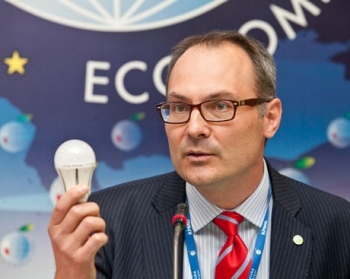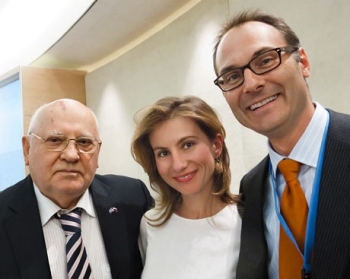“My parents had to escape from Poland for political reasons; we arrived as immigrants in Montreal in 1975,” he recalls.
“We were greeted by Immigration Canada at the airport, but we didn’t know where to go or what to do. So we took a taxi and headed to town. As it happened, the cab driver took us to a house in the North of Montreal where we received a warm welcome, like in a family,” Koniuszewski says.
“That was the welcome we received in Montreal. It was quite important in my life and it shaped my attitudes towards multiculturalism in particular.”
Growing up, Koniuszewski always had a strong love for nature as well. “As an athlete, I spent a lot of my time outdoors, in the mountains or in the forest, and so I was always connected to nature,” he says.
“Already then, pollution and environmental degradation was a big problem for me.”
Gorbachev’s role
The origins of GCI can be traced back to former Soviet president Mikhail Gorbachev, whose support of sustainable development and the reduction of nuclear and chemical weapons helped earn him a Nobel Peace Prize in 1990. He spearheaded the creation of GCI in 1992, after he left office.
It was because of Gorbachev that Koniuszewski first became interested in his current job.
“Green Cross goes back to the reasons why my parents had to leave Poland in the first place,” says Koniuszewski. “Our first time back to Poland was after the fall of Berlin Wall, which was thanks to the actions of historical figures like John Paul II and Mikhail Gorbachev.”
Today, after almost nine years at GCI, he is responsible for the strategic direction of the whole international network, running the day-to-day activities and development of programs.
On top of this, he is project leader of the Climate Change Task Force, which he describes as “a wide range of world-class experts, practitioners from various fields and also political leaders — a cross-disciplinary team to tackle the climate emergency.”
This team includes not only Gorbachev himself but also several well-known figures like Jean-Michel Cousteau — son of famed undersea explorer and pioneering ecologist Jacques Cousteau. It came about as a result of Gorbachev’s Moscow meeting with the then-recently elected United States President Barack Obama.
Gorbachev emphasized to Obama that climate change deserves our full attention. Since then, Koniuszewski says, “We’ve been pushing for urgent action.”
Whether he’s in Paris as part of a group presenting a report on the Universal Declaration of Rights for Humankind to French President François Hollande, as he was last September, or meeting with various other dignitaries throughout the world, Koniuszewski maintains close ties with Montreal.
In fact he is currently helping put together a United Nations Youth Leadership Camp for Montreal in 2017 — an international event organized through the Bridge Foundation, a personal initiative he co-founded with his wife, Margo Koniuszewski, a few years ago.
“She’s heading up the foundation, and I do all I can to support her,” he says.
Designed to bring together young people from around the world to meet through sport, its objective is not sport as such, he explains, but rather about using sport to achieve different social and development objectives — such as how Nelson Mandela eased racial tensions in South Africa through rugby in 1995.
It’s also a chance to return to Montreal and reconnect with Concordia, where he got his start.
“Concordia has a first-class business school; they have one of the best accounting programs in Quebec, and thanks to them I scored very highly — eighth in Quebec — on my professional exams,” he says.
“That was largely thanks to the teachers I had. I still keep in touch with a few of them.”
#CUalumni


 Adam Koniuszewski speaks at the Krynica Economic Forum in September 2015, during a session on Building Retrofits for Energy Security in Europe. | Photos courtesy: Adam Koniuszewski
Adam Koniuszewski speaks at the Krynica Economic Forum in September 2015, during a session on Building Retrofits for Energy Security in Europe. | Photos courtesy: Adam Koniuszewski
 Adam and Margo Koniuszewski with former Soviet president Mikhail Gorbachev (left) in 2012.
Adam and Margo Koniuszewski with former Soviet president Mikhail Gorbachev (left) in 2012.